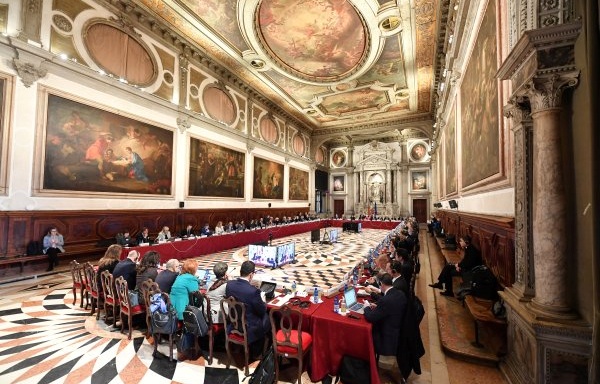
Once the full investigation is completed, the National Audit Office may propose an amendment to the law.Continue reading

In its March 18 opinion, the Venice Commission (VC) analyzed Hungary’s 2023 Act on the Protection of National Sovereignty. Their analysis, however, demonstrates that the current European legislation is not calibrated towards recognizing the concept of national sovereignty. On the other hand, the European institutions are only geared towards combating very specific types of hybrid political threats, while leaving parliamentary democracies exposed to others.
In its analysis, the Commission makes a number of recommendations with regard to the Hungarian legislation that was drafted in reaction to well documented and large-scale foreign interference during the 2022 Hungarian parliamentary elections. Although the VC does recognize the necessity of protecting the electoral process against foreign interference as being in line with international standards, in its analysis it demonstrates an inability to divert from a narrow understanding of what such an illicit intrusion might consist of, and is thus unable to keep pace with national governments’ efforts to protect their political scenery from rapidly evolving hybrid threats.
In their opinion, they affirm that “restrictions that may be imposed on political parties and/or other actors within the electoral process have been dealt with” in a number of previous European recommendations. They say that “the European Union adopted new rules on transparency and targeting of political advertising in order to limit information-manipulation and foreign interference in elections, and to provide rules for political advertising ensuring the respect of the right to privacy and the freedom of opinion and the freedom of speech.”
However, when one looks not only at the letter of these regulations quoted by the VC, but especially their real-world application, it becomes transparent that they are “value based,” that is, geared specifically against foreign threats that challenge the newly defined value-set on the basis of which the dominant European political powers define their goals and aspirations. To put it more specifically,
they were geared towards protecting the European electoral process against perceived or real Russian or Chinese interference.
This was in fact a specific type of political or economic encroachment that the European institutions have warned and legislated against in numerous cases, as recently as February this year.

Photo: Twitter Venice Commission
Threats that the Hungarian Act on the Protection of Sovereignty is geared towards, however, came from the opposite direction: actors from Western-type democracies. Under the guise of “strengthening democracies” or “free speech,” “developing the civil sector,” and so on, there is an ongoing campaign against ideological competitors of European and US-based political players. The campaign is generously funded by, for instance, institutions and private sponsors close to the US Democrats or radical left-wing political and social lobby groups that aim to distort national political processes in their own interests. The existing European “anti-interference” legislation referred to by the Venice Commission is largely defenseless against these threats. It also suffers from a tunnel-vision reminiscent to a cold-war mentality, where threats undermining democratic values come overwhelmingly from external autocratic governments.
The VC opinion continues by claiming that “complex and controversial bills would normally require particularly long advance notice, and should be preceded by pre-drafts, on which some kind of consultation takes place. The public should have a meaningful opportunity to provide input […]. The majority should not manipulate the procedure in order to avoid such public consultations.”
In fact, in November 2023, the Hungarian government launched a non-binding referendum called the National Consultation, in which the last question refers precisely to this issue: “In the past, various foreign organizations have spent billions of euros to support Hungarian political actors and activist groups associated with them. This is their way of forcing Hungary to change its position on key issues. Many see this as nothing more than political corruption.”
All Hungarian citizens have had the opportunity to express their opinion precisely in this specific matter, a luxury that few citizens enjoy in Western democracies.
Some 1.5 million Hungarian citizens have voted for strengthening the legal system against foreign threats, over 95% of respondents. Hence the VC’s view, according to which “the majority should not manipulate the procedure in order to avoid such public consultation” is entirely unfounded.
Furthermore, the acceptance of the new legislation on national sovereignty was preceded by a regular parliamentary consultation. Yet since all the opposition parties, barring one, have been beneficiaries of the ten million dollars that came from US donors preceding the 2022 elections, it surprised few that they opposed the creation of such a change in law. The same applies to the “criticism voiced by some representatives of opposition parties and civil society as to the rapid and non-inclusive process, as well as the European Parliament’s January 18, 2024 resolution that noted that the Hungarian National Assembly adopted a national sovereignty protection package without proper parliamentary scrutiny or public consultation.” The EP’s left-leaning majority, however, had for years shown a tendency towards strong political partisanship against the conservative government in Budapest, leaning almost exclusively towards recommendations of the Hungarian opposition parties who have a vested interest in leaving the door open to foreign sponsors.
The Commission’s opinion also points out with a critical undertone that “the scope of the Act is much wider than the electoral context as it covers state and social decision-making processes where justification based on electoral integrity will not apply. Thus, the powers of the new body extend beyond electoral campaigns to cover political activity in a broader sense and campaigns for social change.”
Unfortunately, this is where the limitations of the VC rapporteurs’ understanding of the battle for national democracies starts to show. The “electoral context” versus “social decision-making processes” is a completely artificial and pointless distinction. The electoral context is not limited to the official election campaign period, it is not limited exclusively to paying for campaign posters or buying air-time in the media. The new hybrid political threats are precisely characterized by their long-term, society-transforming, and educational features that introduce radical social and ethical discourse into society. Through these, they are attempting to tilt the political process to the benefit of parties of their own preference. The debate on migration or open borders is a typical example to such social engineering, thus it is entirely justifiable that a national government addresses this problem through legislation.
“In a democratic State, the threats… such as undue foreign funding of political parties are countered through the ordinary institutions of the State: courts, law enforcement authorities, security services, parliamentary committees, electoral management bodies. This new Office may not encroach on the constitutional competences of these bodies,” reads the VC’s opinion.
It is unclear why the Commission felt it necessary to emphasize this, as it must have been clear to them that the new Office for the Protection of Sovereignty is only equipped with a monitoring and advisory role. It is tasked with collecting data and making recommendations to the State’s regular bodies, the intelligence services, police, courts, etc. It has no authority to “encroach on the constitutional competences of these bodies” whatsoever.
The VC’s opinion also raises the question whether the new Office can be politicized, but invariably ends up questioning Hungary’s presidential system as a whole. They allege that the appointment of the President of the Office for the Protection of National Sovereignty “provides for a highly politicized system of appointment and dismissal without any outside technical input.” They argue that “the appointment of the President of the Office by the President of Hungary – who is not part of the executive but still elected by the majority of MPs and thus typically by the governing party/ies…, risks undermining the President’s, and by extension, the Office’s capacity to carry out their activities in a truly independent way.”
Presidential supervision or patronage of national institutions is entirely commonplace throughout the EU, while raising concerns solely over the fact that the Hungarian President is elected by a majority in parliament and thus is not politically impartial is absurd. Firstly, the parliamentary majority is there because they have a majority democratic mandate from the electorate. Secondly, the president’s term does not overlap with that of parliament, hence the argument loses its validity. The VC’s logic somehow presupposes a flaw in the Hungarian presidential system for its parliamentary electoral system, while in fact Italy and many other states elect their president in a similar fashion, or as is the case in Germany, by a Federal Convention mirroring positions in the Bundestag. Moreover, direct vote through elections does not protect the office of the president from political influence and partisanship any more than it does via the parliamentary system, as examples of highly politicized presidencies in Poland or Slovakia clearly demonstrate.
“Although the protection of national sovereignty is not one of the legitimate aims explicitly identified in the ICCPR and the ECHR, national security, which is also referred in the preamble of the Act, is one of such legitimate aims, and it is more plausible than the first, very broadly and vaguely phrased part of the Act…”, states the VC opinion. It is correct that “sovereignty” is not recognized as a legal concept in the European Union’s founding treaties, but that, many would argue, is one of their cardinal flaws that leaves the EU vulnerable to aggressive federalist attempts at the expense of smaller nations. Yet treating “national security” as a related term to “national sovereignty” is misleading on multiple levels.
The ultimate driving force behind the Hungarian law on sovereignty is a recognition of a decentralized, supranational power structure that aims to usurp many of the competences of the state, and continues down to the level of the nuclear family.
This is a type of threat that specifically originates from radical ideology-, and corporate interest-driven groups embedded in Western societies. They can, and often do, veto the will of the electorate expressed through the classical electoral process through proxy-political movements, supranational organizations, NGOs, etc. The Venice Commission’s entire line of reasoning and legal inferences seem to be oblivious to the existence of such processes threatening modern democracies. It furthermore reflects the value system of current European institutions, most notably the European Parliament, where the above mentioned radical agenda towards federalism is not so much the goal, but only the symptom of a parallel global sphere of influence competing with the classical electoral system.
The regulation of political party funding needs to ensure that parties have “the opportunity to compete in accordance with the principle of equal opportunity.” In the view of the Venice Commission, the prohibition of foreign funding is therefore premised on the fair and equal access of all political parties/forces to domestic sources of financing.
The rather obvious objection the Hungarian government could raise to this proposition is that the “principle of equal opportunity” was not violated by them, but by the opposition coalition that while failing to raise enough funds from their domestic supporters, resorted to accepting millions of dollars from shady US groups with vested interests. Moreover, there is no indication of “fair and equal access of all political parties to domestic sources of financing” having been hindered in any way, except for the glaring fact that
opposition parties have failed to raise enough funds from domestic donors, and had found a legal loophole to remedy the situation in a manner that calls their loyalty to the Hungarian people into question.
“The law is formulated in such a way that it potentially covers any foreign funds received at any time, even completely outside the electoral processes. Such wide regulations may have a chilling effect on the free and democratic debate in Hungary and on citizens’ engagement in elections. These concerns were also expressed by some representatives of civil society,” reads the opinion.
Indeed, this could happen in the future and every new legislation in general brings with it the possibility of abuse or misinterpretation. Yet the responsibility for this lies chiefly with political parties as well as NGOs who broke a social and national contract by knowingly trying to inflate their representation in national and legislative institutions on the back of foreign interest, rather than through genuine domestic demand for their own political program. Well known international non-profit organizations that collect less than ten percent of their operational expenses from Hungarian donors and rely overwhelmingly on foreign donors, cannot be ascribed a leading role in shaping the Hungarian political processes as some US or European institutions would clearly like to see. These NGOs cannot become new, unelected actors in state governance.
Finally, the Sovereignty Protection Office can interfere with the privacy of any legal or natural entity and engage in naming and shaming of this entity without being subject to any control and without any review mechanism, claims the Commission.
Yet any entity that relies on foreign funds, especially if they do so against the law, must and should be named.
Whether after public scrutiny they will be ascribed shame or will be hailed as heroes is entirely up to the citizens. The right for “privacy” cannot overrule the need for transparency within the political process, as we are talking about public figures and taxpayer funded political parties here. This kind of reasoning by the VC is a complete dead end.
The above article is no legal analysis by any stretch, nor is national sovereignty a concept that can be squeezed into narrow legal categories. This is clearly a very specific issue which can only be tested against a set of specific values, a question about in which direction European democracies want to proceed. The Venice Commission is of the opinion that national democracies should not put up barriers to proxy political movements and NGOs representing the goals of global interest groups. And they are right to an extent in pointing out that the broad definitions of the Hungarian sovereignty law are open to ambiguity and misinterpretation. Some might even say that they have amply demonstrated this via their own analysis.
Yet Hungarian democracy, as in so many instances, is breaking new legal ground here in redefining national sovereignty, as well as its primacy over overwhelming geopolitical interests.
This may be a first, and a somewhat crude attempt, but ordinary Hungarians seem to be way ahead of the Venice Commission’s experts in understanding the existential threats that ruthless superpowers may represent to the future of nation-states.
Featured Image: Twitter Venice Commission